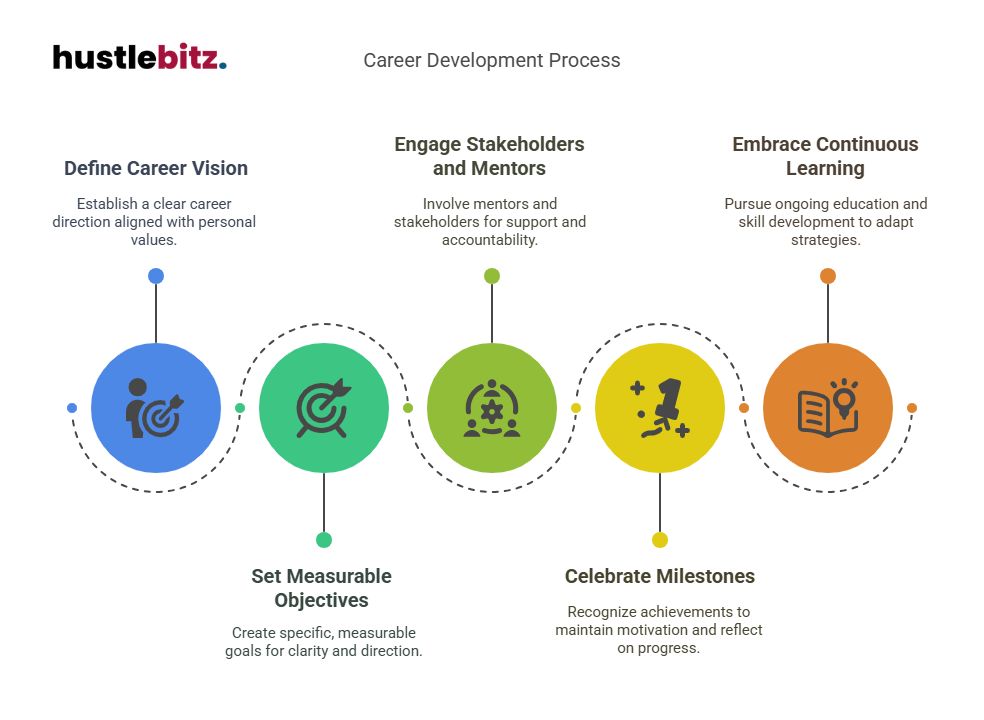To reach career milestones with purpose, start by defining a clear career vision that aligns with your personal values. Implement strategic milestone planning to set measurable objectives, ensuring they resonate with your long-term aspirations. Engage in targeted skill enhancement through mentorship and online courses, while balancing skill development with daily responsibilities. Embrace continuous learning and focused progress tracking to evaluate your journey. By integrating these strategies, you create a purposeful pathway to your career goals. Exploring these elements further reveals additional insights into achieving meaningful progress in your professional journey.
Key Takeaways
- Define your career vision to ensure alignment of milestones with personal values and long-term aspirations.
- Set measurable objectives that reflect both short-term achievements and long-term goals for clarity and direction.
- Engage stakeholders and mentors to gain insights, support, and accountability as you pursue your milestones.
- Regularly celebrate milestones to maintain motivation and reflect on progress toward your overarching purpose.
- Embrace continuous learning and skill development to adapt and refine strategies throughout your career journey.

Define Your Career Vision

Defining your career vision is essential for establishing a clear direction and purpose in your professional journey. A well-articulated career vision aligns your career aspirations with your personal values, enabling you to navigate the complexities of the workforce with confidence. It serves as a guiding star, allowing you to focus on long-term goals while remaining adaptable to changing industry trends.
To achieve vision clarity, engage in self-reflection techniques that prompt a deeper understanding of your professional identity. Consider what drives you, what you are passionate about, and how these elements can inform your career path. This introspection can highlight potential passion projects that not only fulfill you personally but also enhance your professional standing.
Moreover, a robust career vision can improve your future outlook by identifying specific networking opportunities relevant to your field. Building relationships with industry leaders and peers enhances your knowledge base and opens doors for collaboration, ultimately supporting your career aspirations.
As you outline your career vision, ensure it encompasses both short-term objectives and long-term ambitions. By doing so, you can create a roadmap that accommodates your evolving interests and the dynamic nature of the job market.
In essence, your career vision is not only a declaration of intent but also a flexible framework that evolves alongside your growth, ensuring that you remain aligned with your values and aspirations throughout your professional journey.
Strategic Milestone Planning with Intent
Strategic milestone planning involves setting intentional, measurable objectives that align with your overarching career vision, ensuring a structured approach to professional growth. By recognizing the milestone significance in your career journey, you create a roadmap that emphasizes strategic foresight and enables adaptive planning. This proactive method allows you to anticipate challenges and prepare for opportunities, fostering resilience in a dynamic work environment.
Effective strategic milestone planning requires robust accountability frameworks to track progress and encourage commitment. By establishing clear performance metrics, you can assess your advancement toward each milestone and make necessary adjustments in real-time. Resource allocation becomes crucial at this stage, as prioritizing your time and efforts ensures that you are aligned with your strategic goals.
Stakeholder engagement plays a vital role in this planning process, as involving mentors, supervisors, and peers can provide valuable insights and support. Additionally, conducting regular risk assessments helps identify potential obstacles, allowing for preemptive action to mitigate their impact on your career trajectory.
Milestone celebrations are essential for maintaining motivation and reinforcing the significance of your achievements. These moments of recognition not only acknowledge your hard work but also serve as opportunities for reflective evaluation, helping you refine your planning process and set new objectives. By integrating these elements into your strategic milestone planning, you enhance your ability to navigate your career path with purpose and clarity, ultimately achieving the success you envision.
Intentional Goal Alignment
Intentional goal alignment ensures that every objective set in your career path resonates with your long-term aspirations, fostering a cohesive framework for professional development.
To achieve this alignment, individuals must first establish goal clarity by defining specific, measurable outcomes that reflect their personal values and career ambitions. Using alignment techniques such as vision mapping can help visualize the path to success, providing a clear roadmap that connects daily tasks with overarching goals.
Priority setting is crucial in this process; it involves identifying which objectives hold the most significance in relation to your long-term vision.
Intention setting further enhances goal alignment by instilling a sense of purpose behind each objective, ensuring that actions taken are deliberate and aligned with desired outcomes. Incorporating accountability partners can bolster this alignment, as these individuals provide support and encouragement, helping to maintain focus and commitment to the established goals.
Additionally, motivation strategies play a vital role in sustaining engagement and enthusiasm throughout your journey. Implementing success metrics allows for the evaluation of progress, providing insights that can inform adaptive planning to recalibrate goals as necessary.
Purpose-Driven Pathway Design

A purpose-driven pathway design emphasizes the alignment of career choices with individual values and passions, ensuring that each step taken is meaningful and contributes to overall fulfillment. This process begins with purpose exploration, where individuals assess their core values and engage in values assessment to understand what truly matters to them. Passion discovery follows, identifying intrinsic motivation drivers that fuel their enthusiasm and determination.
To create a structured approach to career alignment, one can utilize impact identification, which helps define how personal contributions can affect the broader community and workplace. Establishing purpose statements clarifies individual intentions, setting a foundation for legacy planning. This long-term vision acts as a compass, guiding decisions and actions toward desired outcomes.
By integrating fulfillment metrics, individuals can evaluate progress and ensure that each career milestone aligns with their overarching purpose. The following table outlines the key components of a purpose-driven pathway design:
| Component | Description | Outcome |
| Purpose Exploration | Assessing core values and beliefs | Clear understanding of self |
| Values Assessment | Evaluating what is truly important | Enhanced decision-making |
| Passion Discovery | Identifying personal interests and motivations | Increased engagement |
| Impact Identification | Defining how contributions affect others | Greater community connection |
| Legacy Planning | Establishing a long-term vision and purpose statement | Direction for future endeavors |
Targeted Skill Enhancement Strategies

Targeted skill enhancement strategies are essential for individuals seeking to advance their careers by acquiring specific competencies that align with industry demands and personal aspirations.
One effective approach begins with conducting skill assessments to identify areas for improvement and focus. By understanding one’s strengths and weaknesses, professionals can tailor their development plans accordingly.
Engaging in mentorship programs can provide invaluable guidance and insights from experienced individuals within the industry. These relationships often facilitate networking opportunities, allowing mentees to connect with other professionals and expand their reach.
Additionally, online courses and technical workshops are excellent resources for acquiring new skills and staying abreast of industry trends. Many of these platforms also offer industry certifications, which can significantly enhance credibility and marketability.
Personal branding is another critical component of skill enhancement. By effectively communicating one’s skills and achievements, individuals can position themselves as experts in their fields.
Time management plays a vital role in balancing skill development with daily responsibilities, ensuring consistent progress without overwhelming one’s schedule.
Project management skills are increasingly sought after in various industries; thus, honing these abilities can provide a competitive edge.
Establishing feedback loops with peers and mentors fosters continuous improvement, allowing individuals to adapt and refine their strategies as they progress.
Focused Progress Tracking

To ensure meaningful career advancement, professionals must implement focused progress tracking that aligns their daily activities with long-term goals. This process involves systematic progress measurement, allowing individuals to evaluate their achievements against set milestones. By utilizing data analysis, professionals can identify trends and patterns in their performance, facilitating informed decision-making regarding future actions.
Incorporating feedback loops into progress tracking ensures that individuals receive timely insights about their performance. Regular performance reviews not only assess achievements but also highlight areas for improvement, fostering a culture of continuous growth. Establishing accountability partnerships can further enhance this process; collaborating with a mentor or peer provides external motivation and perspective, reinforcing commitment to individual objectives.
Effective time management and priority setting are essential components of focused progress tracking. By allocating resources wisely, professionals can concentrate their efforts on high-impact tasks that align with their career aspirations. Celebrating milestones serves as a motivational tool, reinforcing progress and encouraging sustained effort towards future goals.
Incorporating reflective practices into tracking routines allows individuals to analyze their experiences critically, ensuring that lessons learned are applied moving forward. This holistic approach to progress tracking not only enhances individual accountability but also ensures alignment with broader career objectives.
Ultimately, focused progress tracking is a vital strategy for professionals seeking to navigate their career paths with purpose and intention, fostering a greater sense of achievement in their professional journeys.
Embrace Continuous Learning

Embracing continuous learning is essential for professionals seeking to adapt to the ever-evolving demands of their industries and enhance their skill sets for future opportunities. Lifelong learning fosters an adaptive mindset, allowing individuals to remain relevant and competitive. By actively engaging in personal development, professionals can diversify their skills, making them more versatile and capable of tackling a range of challenges.
One effective strategy to facilitate lifelong learning is through online courses, which offer flexibility and accessibility. These platforms allow individuals to explore new topics and refine existing skills, contributing to their overall professional growth. Additionally, knowledge sharing within teams and organizations cultivates a feedback culture that encourages continuous improvement. Regular feedback helps individuals identify areas for growth and development, reinforcing the importance of ongoing education.
Networking strategies are also vital in this learning journey. Building relationships with mentors and industry peers opens doors to mentorship opportunities, where experienced professionals can provide insights and guidance. This exchange of knowledge not only supports skill diversification but also enriches understanding of industry trends and best practices.
Ultimately, embracing continuous learning equips professionals with the tools necessary to thrive in their careers. By committing to lifelong learning and actively seeking out educational opportunities, individuals can position themselves for success and navigate the complexities of their professional landscape with confidence.
Final Thoughts
Achieving career milestones with purpose requires a thoughtful and strategic approach. By clearly defining your career vision, setting intentional and measurable goals, and continuously enhancing your skills, you can create a fulfilling and successful professional journey. The key lies in aligning your short-term achievements with long-term aspirations, maintaining focus on personal values, and embracing a mindset of lifelong learning. With regular progress tracking and the support of mentors and peers, you’ll not only reach your goals but also find meaning and satisfaction along the way. Stay adaptable, stay driven, and always pursue growth with intention.




